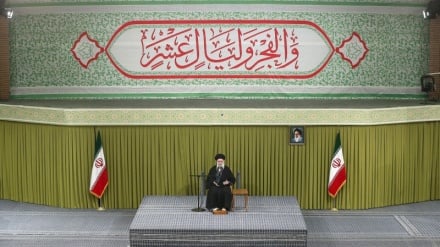Trump threatens war crimes against Iran. Congress must stop him
The United States terrorist regime has violated the United Nations Charter’s prohibition on the use of military force. This is the time to raise our voices and demand that our congressional representatives put a halt to Trump’s illegal war-making.
It should be clear to any legal analyst that Donald Trump’s catastrophic decision to order the illegal assassination of Iranian Maj. Gen. Qassim Soleimani and Iraqi senior military leader Abu Mahdi al-Muhandis constituted the crime of aggression and violated both the United Nations Charter and the U.S. War Powers Resolution.
This was part of an article by Marjorie Cohn, professor emerita at Thomas Jefferson School of Law titled: Trump Threatens War Crimes against Iran. Congress Must Stop Him.
This article has been published in Truthout website.
The terrorist US president, Donald Trump has already committed the crime of aggression against Iran, and he is now threatening to commit a war crime if he carries through on his January 4 promise to target Iran’s cultural sites.
The United States terrorist regime has violated the United Nations Charter’s prohibition on the use of military force. This is the time to raise our voices and demand that our congressional representatives put a halt to Trump’s illegal war-making.
It should be clear to any legal analyst that Donald Trump’s catastrophic decision to order the illegal assassination of Iranian Maj. Gen. Qassim Soleimani and Iraqi senior military leader Abu Mahdi al-Muhandis constituted the crime of aggression and violated both the United Nations Charter and the U.S. War Powers Resolution.
The January 2 drone attacks that martyred Soleimani, al-Muhandis and al-Muhandis’s public relations chief were the deadliest escalation of Trump’s “maximum pressure” campaign against Iran since his May 18, 2018, withdrawal from the Iran nuclear deal.
In May 2019, one year after Trump pulled out of the agreement, Secretary of State Mike Pompeo claimed U.S. intelligence had concluded that Iranian-sponsored attacks on U.S. military personnel were “imminent.” The New York Times said the administration made that allegation “without evidence” to support it.
Now, seven months later, Team Trump is again invoking the threat of an “imminent” Iranian attack to justify its illegal assassination of Soleimani, and once again, it cites no evidence to substantiate such a threat.
According to international law, the use of military force by one country against another must comply with the UN Charter.
Article 2.3 requires that all member states “settle their international disputes by peaceful means in such a manner that international peace and security, and justice, are not endangered.”
Article 2.4 requires all member states to refrain in their international relations from the threat or use of force against the territorial integrity or political independence of any state.
There are only two exceptions to the UN Charter’s prohibition of the use of military force: when a country acts in self-defense or with permission of the Security Council. The drone assassinations were not carried out in self-defense and the Security Council did not sanction them.
Trump’s drone killings did not constitute lawful self-defense. Article 51 of the UN Charter establishes the inherent right of self-defense in response to an armed attack by another state. Soleimani was a national of Iran. Neither Iran nor Iraq, where the assassination occurred, had mounted an armed attack on the United States before the fatal U.S. drone strikes.
Moreover, Agnès Callamard, UN special rapporteur on extrajudicial, summary or arbitrary executions, tweeted that the drone killings were “most [likely] unlawful and violate international human rights law.” Callamard said, “Outside the context of active hostilities, the use of drones or other means for targeted killing is almost never likely to be legal.”
She wrote that “intentionally lethal or potentially lethal force can only be used where strictly necessary to protect against an imminent threat to life.”
Nor were the drone strikes authorized by the Security Council. The Council has primary responsibility to maintain international peace and security under the UN Charter.
Article 39 states, “The Security Council shall determine the existence of any threat to the peace, breach of the peace, or act of aggression” and decide whether to authorize the use of military force under Article 42.
In fact, it was Trump, the terrorist who committed the crime of aggression.
Under the Rome Statute for the International Criminal Court, individuals can perpetrate an act of aggression in two different ways that are pertinent here. The U.S. bombings that martyred Soleimani and al-Muhandis constitute aggression under both criteria.
First, aggression is “bombardment by the armed forces of a State against the territory of another State or the use of any weapons by a State against the territory of another State.” U.S. armed forces conducted a bombing attack in Iraq.
Second, aggression is, “The use of armed forces of one State which are within the territory of another State with the agreement of the receiving State, in contravention of the conditions provided for in the agreement or any extension of their presence in such territory beyond the termination of the agreement.”
Iraq and the United States have a joint military agreement governing the stationing of U.S. troops in Iraq.
Adel Abdul-Mahdi, Iraq’s acting prime minister, called the U.S. bombing “a flagrant violation of the conditions for the presence of the American forces in Iraq and their role which is supposed to be limited to training Iraqi forces and fighting ISIS [also known as Daesh] within the international coalition forces, under the supervision and approval of the Iraqi government.”
The drone killing also violated the War Powers Resolution, which permits the president to introduce U.S. armed forces into hostilities or imminent hostilities only after Congress has declared war, or in “a national emergency created by attack upon the United States, its territories or possessions, or its armed forces,” or when there is “specific statutory authorization,” like an Authorization for Use of Military Force (AUMF).
Iran had not attacked the U.S. or its armed forces and Congress had not declared war on Iran or authorized the use of U.S. force against Iranian targets.
National Security Adviser Robert O’Brien said the killings were justified by the 2002 Authorization for the Use of Military Force Against Iraq. That AUMF authorized the president “to use the Armed Forces of the United States as he determines to be necessary and appropriate in order to — (1) defend the national security of the United States against the continuing threat posed by Iraq; and (2) enforce all relevant United Nations Security Council resolutions regarding Iraq.” Once the U.S.-led forces invaded Iraq and eliminated the government of Dictator Saddam Hussein, the 2002 AUMF license ended.
Trump, the terrorist promised in a January 4 tweet to target “52 Iranian sites,” some of which are “at a very high level & important to Iran & the Iranian culture” if Iran retaliates against the drone killings.
The Rome Statute makes it a war crime to intentionally direct “attacks against civilian objects, that is, objects which are not military objectives.” Cultural sites are not proper military targets.
It is also a war crime under the Rome Statute to intentionally direct “attacks against buildings dedicated to religion, education, art, science or charitable purposes [and] historic monuments.”
In addition, the 1954 Hague Convention for the Protection of Cultural Property prohibits military targeting of cultural sites. Iran has 24 locales on the UN list of cultural world heritage sites.
By promising to target Iran’s cultural sites, Trump threatened to commit a war crime.
After the drone attacks, Javad Zarif, Iran’s foreign minister, called Soleimani the leader of “the most effective force” in the fight against ISIS and al-Qaida, and called his killing an act of “international terrorism.”
Leader of Islamic revolution, Ayatollah Khamenei vowed to take “severe revenge” against those responsible for Soleimani’s martyrdom.
Hassan Nasrallah, leader of the Iran-backed group Hezbollah in Lebanon, issued a call to all “resistance fighters” to avenge the killing of Soleimani: “Meting out the appropriate punishment to these criminal assassins … will be the responsibility and task of all resistance fighters worldwide,” Nasrallah said.
The government of Iraq is furious at the killings on its soil without its permission. Acting Prime Minister Adel Abdul-Mahdi called the attack “an outrageous breach to Iraqi sovereignty” and “a clear breach of the terms of the American forces’ presence.”
In fact, the Iraqi parliament voted in a nonbinding resolution to ask the government to terminate the presence of the 5,000 U.S. troops currently in Iraq and the agreement that permitted the U.S. to send troops to Iraq to fight ISIS. Ironically, Joe Lauria wrote at Consortium News, “Soleimani was one of the men most responsible for defeating ISIS in Iraq and Syria.”
The day after the drone strikes, Trump the terrorist made the Orwellian statement, “We took action last night to stop a war. We did not take action to start a war.” But start a war is just what Trump’s actions have effectively done. It is up to Congress to exercise its constitutional duty to stop this dangerous presidential overreach.
As Yale law professor Oona A. Hathaway warned in her op-ed in The Atlantic, “If Congress fails to effectively press back against this unconstitutional assertion of unilateral authority, it will set a precedent that will put the greatest destructive power the world has ever known in the hands of a single man.”
Americans must pressure congressional representatives to put an end to Trump’s illegal war-making. Two resolutions have been introduced in Congress: one by Rep. Ro Khanna (D-California) and Sen. Bernie Sanders (I-Vermont) to prohibit funding for war with Iran unless Congress gives its approval. The other is co-sponsored by Senators Tim Kaine (D-Virginia) and Dick Durbin (D-Illinois), mandating removal of U.S. troops engaged in hostilities with Iran unless Congress approves. Urge your Congress members to support them. Peace in the West Asia region – and indeed worldwide – is at stake.
AE/SS


